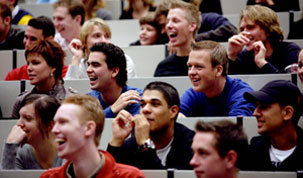Homo’s betere student

It has been well documented that sexual minority individuals aresignificantly more likely to be college educated than heterosexualindividuals [Black, D., Gates, G., Sanders, S., & Taylor, L.(2000). Demographics of the gay and lesbian population in theUnited States: Evidence from available systematic data sources.Demography, 37(2), 139-154; and others]. Yetthere is very little scholarship on the experiences of sexualminorities in college.
We discuss several ways that sexual orientation could matter forcollege outcomes, and we provide the first empirical evidence onthis question by using confidential data on over 40,000 studentsfrom the 1997, 1999, and 2001 waves of the Harvard College AlcoholStudy. We identify sexual minorities by using responses toquestions about the sex of the respondent’s lifetime sexpartners.
After conditioning on observable demographic characteristics andinstitution fixed effects, we find that (compared to theirheterosexual peers): (1) gay males have higher college grade pointaverages and perceive their academic work as more important; (2)gay and bisexual males are more likely to report the presence of afaculty member or administrator with whom they could discuss aproblem; and (3) gay and bisexual males place more importance onparticipating in student organizations, volunteer activities, thearts, and politics.
Among females, we find that: (1) bisexual females are lesssatisfied with the education they are receiving, spend less timestudying, and perceive their academic work as less important; and(2) lesbian and bisexual females place more importance onparticipation in the arts and politics. These patterns suggestimportant and complex relationships between sexual orientation andcollege outcomes.
Meest Gelezen
Vrouwen houden universiteit draaiende, maar krijgen daarvoor geen waardering
Wederom intimidatie van journalisten door universiteit, nu in Delft
Hbo-docent wil wel rolmodel zijn, maar niet eigen moreel kompas opdringen
‘Burgerschapsonderwijs moet ook verplicht worden in hbo en wo’
Raad van State: laat taaltoets nog niet gelden voor hbo-opleidingen



